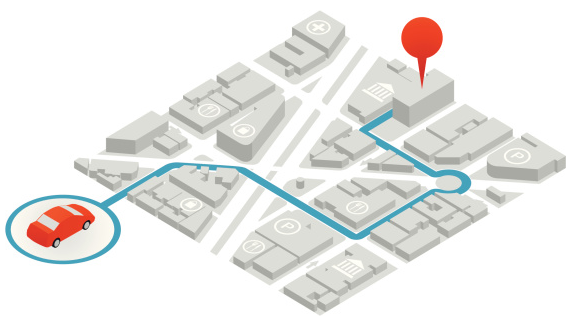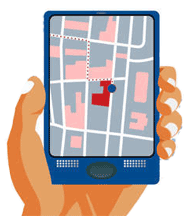There are many reasons an employer may want to use GPS location tracking technology to monitor the whereabouts of its employees.
These are some examples of where GPS tracking might provide some degree of help in the workplace:
- You suspect an employee of misusing company time to conduct personal business;
- You suspect an employee is engaged in illegal behavior, such as pilferage or drug use;
- You suspect an employee is misusing company paid sick leave;
- You suspect an employee of misappropriating company secrets or colluding with a competitor;
- You are concerned about whether an employee is on a personal diversion rather than his appointed task when using his personal vehicle.
These however, are only a few examples of where an employer may consider engaging in Geo-location to confirm reasonable suspicions about a particular employee.
The question then arises, what can the employer legally do to obtain some evidence to confirm these suspicions?
For company-owned vehicles, the law is clear that an employer may put a GPS tracking device on the vehicle. The company-owned vehicle is the employer’s property, and its use for a business purpose is an extension of the workplace.

In O’Connor v. Ortega 480 US709 (1987), the US Supreme Court held that workplace searches never require a warrant. Also see, Matter of Caruso v. Ward72 NY2d 432 (1988)(applying New York law, random workplace drug testing does not require a warrant).
But what about placing a GPS tracking device on an employee’s personal car? Is this ever legal? What restrictions and limitations apply?
Employers now have guidance in this matter.
In Cunningham v. New York State Dept. of Labor (2013 NY Slip Op 04838), New York’s Appellate Division heard a case in which the employee was subjected to discipline based on evidence obtained through the use of a GPS tracking device installed on his personal car.
Michael Cunningham worked in the state’s department of labor in a management position. He was a 20-year veteran of the department and much of his work was performed either in the field or in remote locations.
His employer suspected that he was submitting false time reports and taking unauthorized absences. They believed he was claiming he was on extended business trips, when he had actually returned home much earlier than his timesheets showed.
The employer hired an investigator to follow his car to confirm their suspicions. Cunningham was successfully able to elude the tailing investigator several times. Thereafter, the employer attached a GPS tracking device to the wheelbase of Cunningham’s personal car, without Cunningham’s knowledge.
The employer tracked the movements of Cunningham’s car for one month. During that time period, the GPS tracking device required two replacements. Through the evidence obtained by the tracking device, the employer brought disciplinary charges against Cunningham which resulted in termination of his employment.

The reviewing court found that the use of GPS tracking device to confirm suspicions about Cunningham’s absences and timekeeping records was reasonable. It further held that tracking the car’s movements for one month was a reasonable length of time.
However, the court also ruled that the search was excessively intrusive. Because the employer was tracking the movements of Cunningham’s car 24/7, and this would include considerable time periods when Cunningham made no claim that he was working, the search exceeded its permissible scope. The employer, who replaced the GPS device twice during the surveillance, could easily have removed it when Cunningham took a personal vacation. The court found that the employer failed to make a reasonable effort to avoid tracking Cunningham when he was outside of business hours.
Generally, New York’s privacy protection with respect to GPS tracking is stated broadly in its State Constitution. The right of the people to be secure in their persons, houses, papers and effects, against unreasonable searches and seizures, shall not be violated, and no warrants shall issue, but upon probable cause, supported by oath or affirmation, and particularly describing the place to be searched, and the persons or things to be seized. NY State Constitution, Article I, Section 12
In Cunningham, New York’s appellate division concluded that the placement of a GPS tracking device on an employee’s personal car is not subject to the constitutional warrant requirement, because a personal car which is used in any way for a business purpose is an extension of the workplace.
Thus, the court has distinguished the employment setting from the police investigation setting. Cf People v. Weaver, 12 NY3d 433, 447(2009)(holding the attachment of a GPS tracking device to a suspect’s car always requires a court-issued warrant supported by probable cause). United States v. Jones 132 S.Ct. 945 (2012)(holding attachment of GPS tracking device to a suspect’s car is a trespass and requires a warrant.) Interestingly, that distinction means the case is inapplicable to other GPS tracking technology, such as mobile phone GPS tracking applications.
Yet, an employer who has reasonable grounds to use location tracking technology on the employee’s car, must monitor with reasonable care. Constant tracking of an employee’s car is liable to violate the employee’s right of privacy.

Security companies that manufacture GPS tracking devices would be wise to design the device so as to allow employers to turn the monitoring function off during non-working hours and weekends. This would avoid the Cunningham situation, where the employer’s reasonable use of the GPS tracking device was made unreasonable by being overly intrusive into the employee’s private life – the employee’s off-work hours.
As an employer, if you are going to use GPS tracking devices, you should make sure that the device has a scheduler and that your HR department creates a policy that the employer will reasonably refrain from using GPS tracking during off-work hours.
You should also make sure that your HR department thoroughly documents any targeted GPS location tracking of an employee’s personal car. They should detail the suspicion that surrounds the employee’s conduct, why less intrusive means of investigation would not be effective, and the proposed limits of the surveillance that will be used during the investigation of the employee.